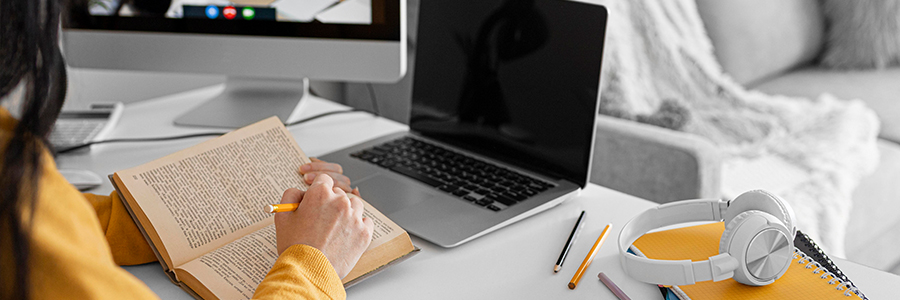Home / Students / Self-improvement / How to gain self-confidence in studies
How to gain self-confidence in studies
Self-confidence is a trait crucial for advancement. Whether we are talking about learning, work, or interpersonal relationships – self-confidence allows us to overcome any difficulty with ease. However, being able to feel confident in yourself and your success is not easy, especially in a competitive environment.

What is self-confidence
According to research, the term self-confidence refers to believing in yourself and your ability to overcome anything you face. A self-confident person accepts new challenges, seizes available opportunities, fights all difficulties, and is ready to take responsibility for own actions.
Why self-confidence is important for students
Self-confidence helps students develop their social skills and their resilience, allowing them to reach their full potential in and out of the classroom. Students with a healthy level of self-confidence are aware of their abilities, they also accept their weaknesses and work on them to keep improving themselves.
Self-confidence affects several factors important for success in education.
- Fear and anxiety – Self-confidence reduces anxiety. Self-confident students think less about their mistakes and instead focus on further progress and learning.
- Motivation – A low level of self-confidence makes students not feel good enough to realize their goals. Self-confidence lets students maintain motivation and dedication to the realization of set objectives.
- Resilience – Self-confidence allows students to view failure as an integral part of development. Students with a high level of self-confidence have no fear of making mistakes – they learn from their errors.
- Social relationships – Self-confident students find it easier to fit into their environment. This lets them establish better communication with their peers and their teachers.
Strategies for building self-confidence in students
In some individuals, self-confidence develops at an early age, while in others, the lack thereof remains a problem even when they reach maturity. Lack of confidence is one of the greatest obstacles for students. Self-confidence is, after all, a trait that facilitates our entire educational process.
Several strategies can be effective to gain self-confidence:
1. Control negative self talk
Students are often their own greatest enemies. Statements like “I am not good/smart enough,” “Others know a lot more,” or “I am not going to pass this test” are basically a routine for some students. This sort of self talk largely affects not only self-confidence, but mental health in general.
If a students constantly “reassesses” himself/herself about personal incompetence, motivation will decrease, which further leads to poorer results and problems with knowledge adoption. This is why it is important to keep reminding yourself of your achievements and the obstacles you have already overcome.
Another important thing is not to compare yourself with others, and to accept your own pace. The success of another is never an indicator of our failure. It is sometimes wise to peruse motivational quotes.
2. Talk to your teachers
One of the ways to increase self-confidence while in school is to communicate with your teachers. Teachers can give feedback and help the student find ways to improve. Students do not get feedback and they are left to their own devices.
It is crucial to establish communication with teachers, if you have not understood something in the lesson, ask for an additional explanation. Consult them about the best learning strategies and the best ways to prepare for a test. Discuss your progress so far and the problems you are facing when you are studying. Open communication with teachers is the key to improving results and building self-confidence in school.
3. Organize your time and your obligations
Time management is a challenge for many people. It does not come down just to problems with procrastination – other concerns include trouble with assessing one’s own capacities, not calculating time for rest, or neglecting time for extracurricular activities, etc.
A proper time management and organization of tasks, with regular breaks, reduces stress and ensures that we fulfill all our obligations in time. Students achieve better results, prepare well for tests and other forms of knowledge assessment, when they follow an organized schedule thereby increasing their self-confidence.
4. Practice at home
Sometimes, our greatest source of anxiety are exams or presentations, i.e. speaking in public. The former demonstrate the results of our efforts, while the latter develops our social skills.
In both cases, fear and lack of confidence prevent us from showing ourselves in the best light. Even when we get organized and prepare well for a test, fear can lead to a block, and the results do not reflect our actual knowledge. On the other hand, if the grade depends on oral presentation, lack of self-confidence when speaking in public can spoil the end result.
This is why it is advisable to prepare in advance. Do some preparation tests or organize a trial presentation in front of parents or friends. You can also always form study groups and receive feedback from other students regarding the clarity of your presentation. Any “trial” will contribute towards building your self-confidence.
5. Accept constructive criticism
The question of how to gain self-confidence in your studies, among other things, is the question of learning how to accept criticism. Considering the hard work and time invested, students tend to take lower grades or negative comments too personally, i.e. perceive them as a sign of “failure”.
Taking into account the fact that schooling takes quite a while, as well as the fact that everyone has their own strengths and weaknesses, and that we are not all equally good at everything, lower grades and negative comments should be understood as constructive criticism. Build your confidence by using this criticism towards advancing yourself.
6. Avoid negative criticism
As we have mentioned at the beginning, students are often their own greatest critics. However, criticism and pressure most often come from outside, from other people. However much you have achieved, some tend to focus on the things you have not done or the things you have done wrong.
The recognition of this type of behavior is very important, as the source of criticism can be the people close to us, such as parents, friends. If you notice that this is someone’s MO, distance yourself from their comments.
How to feel confident before an exam
Although self-confidence is built gradually and affects various aspects of our education, it is most noticeable when we are being tested. Like we said, anxiety often leads to test results not reflecting real knowledge and abilities. This is why it is important that students build confidence, conquer fears and achieve progress. There are several tips that are quite important to keep in mind before any exam/test.
1. Prepare well
One of the logical answers to the question of “How to gain self-confidence in study” is – to work regularly. Regular work does not mean constant studying, but studying that is well-organized and in accordance with our abilities. If you start preparing for a planned test on time, you will be sure of your knowledge.
Preparation implies regular attendance, taking notes, engagement, revising etc. Divide the material into smaller areas you will gradually master over a period of time. To master the required materials, you must learn how to stop procrastinating and start studying – which is one of the greatest problems students face.
Time for rest is just as important. Over time, the information we adopt settles into our long-term memory. So, it will take a couple of days to be sure that we know something. This is why it is not a good idea to prepare for a test a day or two ahead.
2. Take notes or talk to others
One of the ways to better memorize what you are learning is to take notes. Some students learn better through reading, some through listening. However, the brain processes the information we write down differently – there is a possibility that what we write will be better remembered.
Another option is learning within groups. It is important that the information we adopt be understood, not merely remembered. Talking about what we have learned can help us connect the acquired knowledge with some other ideas, as well lead to a more comprehensive understanding of the concept.
3. A healthy mind in a healthy body
Self-improvement does not imply only the mental aspect, but the physical one, too. Studying without regular breaks, an unhealthy diet, lack of sleep and physical activity – all this affects our mental health and our self-confidence. If you come to a test hungry or without getting enough sleep, your concentration will deteriorate and you will feel like you cannot remember anything.
This is why it is crucial to be well-organized. You can study in intervals, with breaks during which you can take a walk or engage in another physical activity. This will keep you physically engaged, and also give your brain some time to process information.
4. Maintain a positive attitude
Whatever we do, our attitude towards it is crucial. Tests are among the factors that affect our attitudes towards learning and education the most. They serve to check our progress thus far, and sometimes determine the future of our education. Because of their importance, students often view tests as “turning points”.
This way of looking at things makes it hard to maintain a positive attitude immediately before a test, which leads to increased anxiety, a decline in concentration and, perhaps, to results that are less than expected. Before the test, try not to think about what awaits you and not to dwell on whether you have covered all that you should have and what you might have missed. Relax and think about it as a step that leads you closer to your goal. Even if you do not reach immediate success, this approach will point you towards the things you need to work on some more.
Increasing self-confidence in studies – key points
Learning how to develop self-confidence in studies is not hard if you use adequate approaches and strategies. What are the most important things to remember?
- Self-confidence is belief in yourself and your abilities.
- Self-confidence is a crucial trait for students. It makes the education process easier, facilitating knowledge adoption, the development of the student’s personality, and the student’s progress.
- The development of self-confidence during schooling requires constant implementation of adequate strategies.
- Self-confidence is especially important when it comes to examinations. Tests will not reflect our actual knowledge and abilities if we have an anxiety problem. There are several tips that help us feel more self-confident and emancipate ourselves from insecurity.
Building student confidence is a task that should be shared by students, parents and teachers. Elementary school, high school, and college are crucial periods for personal development. Through formal education, we not only gain knowledge for our future profession, but also develop our personality and our social skills.









